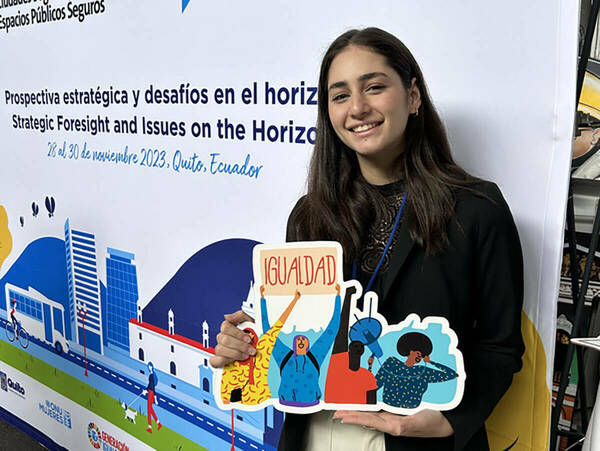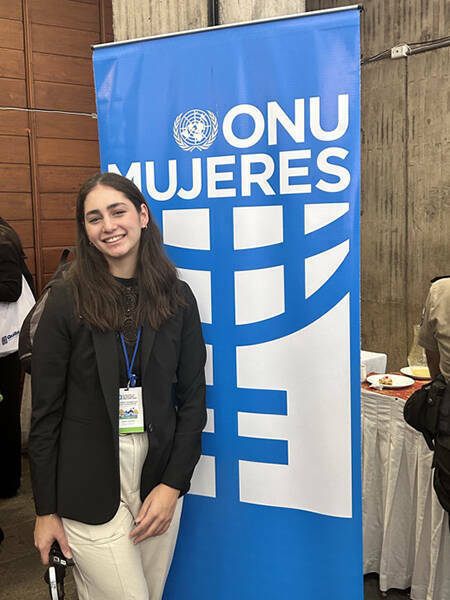
Isabela “Isa” Tasende believes today’s most pressing issues — immigration, violence against women, private business influences — are best understood and addressed from an interdisciplinary perspective.
“We live in a world of hyperspecialization, and the lack of interdisciplinary understanding, I think, has led to big gaps in people not knowing how to talk to each other about these issues,” she said.
Originally from Panama, Tasende has always had an interest in understanding policy and helping people. Now a senior at the University of Notre Dame, she majors in political science and economics and has a minor in theology. The diverse coursework has led to opportunities in law, research, and consulting — and they’ve equipped her to tackle worldwide problems from a more connected perspective.
“I’m all about filling the gaps,” Tasende said. “Between public, private, civil society; between different disciplines. I think a more interconnected world is a more efficient one.”
The Notre Dame difference
When making her college decision, Notre Dame’s emphasis on using education for good piqued Tasende’s interest.
“I sensed that Notre Dame imbues deeper questions of meaning, purpose, and service into its curriculum and into the way that it approaches issues,” she said.
In addition to the University's unique perspective on the purpose of education, Tasende was also drawn to the people.
“The sense of community that I could feel — from alumni that had reached out, from people who messaged me who were currently at Notre Dame, from members of my scholar program that made an effort to make me feel welcome — was definitely a huge factor,” she said.
"Notre Dame cares about you as an academic, and they care about who you're going to be as a professional,” she said. “But most importantly, they care about who you are as a person."
Since then, Tasende has become a leader within the Notre Dame community. She was a commissioner at Johnson Family Hall her junior year, serves as a mentor for the Building Bridges Mentoring Program for students from historically underrepresented communities, and is the president of the Latino Honors Society.
Mentorship has been key to Tasende’s experience at Notre Dame. She believes it’s important to get involved and become a leader in the community in order to continue the cycle of gratitude of those who came before. Tasende credits her mentors for sharing their wisdom and time in helping her become who she is today.
"Notre Dame cares about you as an academic, and they care about who you're going to be as a professional,” she said. “But most importantly, they care about who you are as a person."
Applying interdisciplinary study with international research
Through her studies in political science and economics, Tasende has been able to utilize both qualitative and quantitative tools to study humanity’s most pressing questions from different angles. And through her theology minor, she’s further contextualized her scholarship.
“I wanted to get a well-rounded understanding of the human person in society and the problems that we face,” Tasende said. “So much of how you think of solutions has to do with your belief system, and I wanted to have the language to explore and understand what drives people to act a certain way.”

Addressing social policy issues has interested Tasende from a young age. As a high school student, she co-founded an organization that helped young pregnant women finish their education and find employment.
She continues exploring social and political issues through the Kellogg International Scholars Program. And she is currently working with Keough School of Global Affairs associate professor Abby Córdova to research violence against women in Central America by examining how armed groups create spaces of control and leave women at the margins. Last fall, Tasende and Córdova traveled to Ecuador to present their findings at the UN Women Safe Cities and Safe Public Spaces Global Leaders’ Forum.
Tasende continues to engage in international research with her senior thesis, which focuses on the authoritarian consolidation of Venezuela. She has personal ties to the project — her family grew up in Venezuela before moving to Panama. Her research was motivated by her experience with displacement and migration due to the country’s wider political crisis, and it has allowed her to reconnect with an issue close to her heart.
“Over 7 million Venezuelans have fled the country since the regime's consolidation, creating one of the largest migration crises in world history. My family makes up just four of those millions,” Tasende wrote about her thesis. “My personal and academic interest in Venezuela's democratic revival pushed me to understand which factors stand in the way of democratization and how the armed forces have served as a bulwark for the regime in times of crisis.”
Piecing together career paths
Tasende has considered attending law school after graduation and joined the Pre-Law Student Board to connect with other interested students. After her freshman year, and with support from the Hesburgh-Yusko Scholars Program, she gained experience at the National Immigrant Justice Center translating and interpreting legal interviews.
“It pushed me to go beyond studying these issues in theory,” she said, “and trying to think about practical solutions and practical implications for how we can tackle them in the real world.”
Tasende eventually realized that she needed another piece to complete the puzzle of her career explorations — the private sector.
She saw consulting as the perfect opportunity to bring her skillset to a new field, so she joined Notre Dame’s Consulting Connect Student Board to explore management consulting as a career path. She spent a summer as a transfer pricing intern at PWC, then interned in strategy consulting at Bain & Company, where she will start working full-time after graduation. She hopes to eventually apply this expertise to work in international development, bridging her interests to advance the common good.
Throughout her career explorations, Tasende has found that a liberal arts education provides foundational skills to use in any sector or industry.
“At the end of the day, you might not know exactly what career is right for you,” she said. “So what you want are the skills to succeed wherever you go.”
Originally published by at al.nd.edu on March 21, 2024.